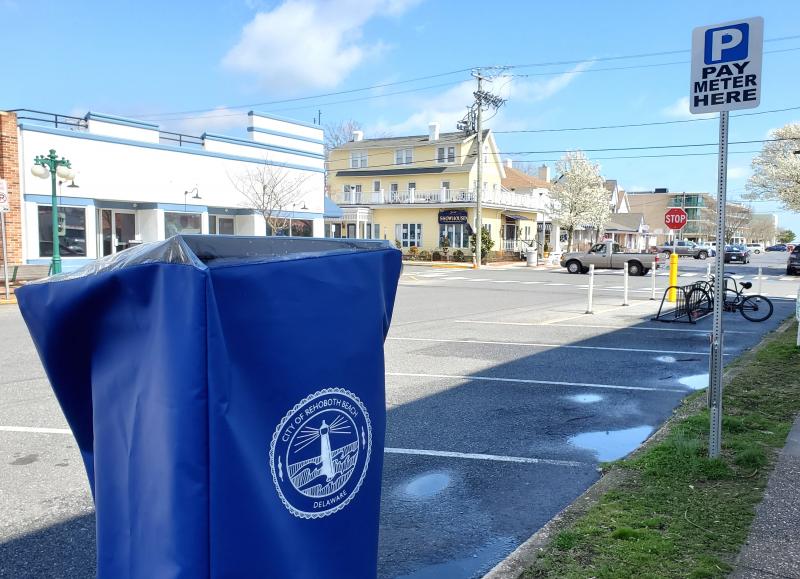Rehoboth adopts 12-hour parking at meters
Parking meter season begins in Rehoboth Beach the Friday before Memorial Day, and when visitors return there will be no time restrictions.
During a commissioner workshop March 9, commissioners finalized parking-related changes for the 2020 season. There is really only one change – from a three-hour limit to no limit at all for how long a vehicle can be parked in the same spot.
“Let’s try the 12 hours,” said Mayor Paul Kuhns. “This may be something that works and people are happy about it.”
Commissioner Susan Gay said she had mixed feelings. The parking committee recommended limiting parking to three hours to create turnover so people aren’t parking in front of a business all day, she said.
“Aren’t we just going to go back to that same problem again?,” said Gay, shrugging her shoulders.
Commissioner Pat Coluzzi said she thinks the people who can afford to pay for parking in downtown Rehoboth all day are the ones who are going to be doing the shopping. Plus, she said, it doesn’t make sense for the city to enforce the time limits if the businesses don’t want it.
“The businesses overwhelmingly wanted to go to 12 hours,” said Coluzzi. “We all agreed that we thought [a 3-hour-limit] would be a good idea, but it didn’t turn out that way.”
The 3-hour limit was one of a handful of changes made for the 2019 season. Other changes included eliminating the ability of rental property owners, including hotels and motels, to purchase $30 transferable permits, an increase in the hourly rate for meters, extending the permit season to mirror the meter season, and an increase in the cost of the weekly pass from $80 to $90.
The 3-hour limit was the only change that garnered any reaction from businesses at the end of the season. During a Rehoboth Beach-Dewey Beach Chamber of Commerce Downtown Advisory Task Force meeting in late September, a number of businesses complained about the change.
In response, a couple of months later, the city’s parking committee recommended a change from three hours to four hours. Commissioners took that recommendation further.
Kuhns said that he thinks people would find a way to park downtown anyway, and having the same hour limits across the board will make it easier for staff.
Commissioner Ed Chrzanowski said he agreed with Gay about the turnover, but ultimately, he said, it’s what the businesses want. He said one thing to think about is a loss of parking fine revenue if there are no time limits.
Kuhns said he hopes the city will pick up that lost revenue in other places.
Commissioners also agreed to a change to the 30-minute meters. Kuhns said there are approximately 65 30-minute meters throughout the city, but many of them are clumped in front of a handful of businesses. He said this leads to empty parking spaces at night.
Kuhns then suggested keeping some meters in those clumps at 30 minutes all day, but changing the majority of them to hourly after 4 p.m. The commissioners agreed.
Chrzanowski said if changes are going to be made, the city should make the signs at the 30-minute spots taller and more visible.
Commissioners discussed other possible parking-related changes, but none are coming this year. Those changes include an increase to the cost of parking meters and permits, a limit on the number of transferable permits for property owners, and head-in parking on a number of city streets with parallel parking.
Kuhns said the city could realize 50 to 60 more parking spaces if areas on some streets – King Charles, Oak, Pennsylvania and near the cemetery on Henlopen Avenue – changed from parallel parking to head-in parking.
Gay said she had heard from the residents of King Charles, and she said it was not a popular idea. Once the amount of space for people to leave driveways is taken into account, there may not be as many spaces as expected, she said.
Chris Flood has been working for the Cape Gazette since early 2014. He currently covers Rehoboth Beach and Henlopen Acres, but has also covered Dewey Beach and the state government. He covers environmental stories, business stories and random stories on subjects he finds interesting, and he also writes a column called Choppin’ Wood that runs every other week. Additionally, Flood moonlights as the company’s circulation manager, which primarily means fixing boxes that are jammed with coins during daylight hours, but sometimes means delivering papers in the middle of the night. He’s a graduate of the University of Maine and the Landing School of Boat Building & Design.


















































